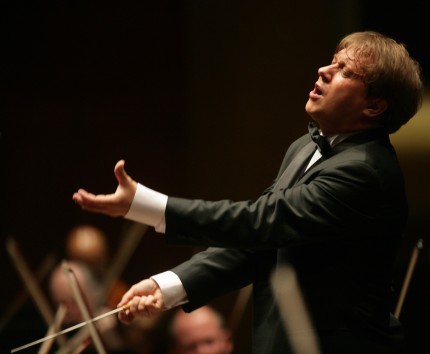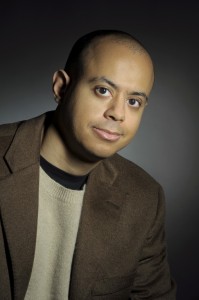Morlot, CSO Women’s Chorus put across Messiaen’s ecstatic spirituality

The Chicago Symphony Orchestra and conductor Ludovic Morlot launched their program Thursday night with something that is increasingly a rarity at Orchestra Hall: the CSO premiere of a large-scale 20th century work that is not an obvious crowd pleaser.
Olivier Messiaen completed his Trois petites liturgies de la Presence Divine (Three short liturgies on the Divine Presence) in 1944, one of a group of celebrated wartime works, along with the Quartet for the End of Time and Vingt regards sue l’enfant-Jesus.
A choir of women’s voices is the principal protagonist, backed by a string orchestra and Messiaen’s characteristically individual instrumental lineup, here featuring piano, celesta, ondes martenot, vibraphone and percussion. At 47 minutes, the Trois liturgies is an expansive work, characteristic of the French composer’s oeuvre — ecstatic, strange, and deeply redolent of Messiaen’s Roman Catholic faith.
Messiaen’s distinctive style remains an acquired taste for many, and one I confess I haven’t been able to acquire, at least for large-scale works such as this. Messiaen’s music for his own fervently religious texts is often beautiful in between the Gallic sprechstimme passages. There’s also striking contrast throughout, as with the vitality and rhythmic complexity of Messiaen’s second movement (did this music inspire Leonard Bernstein in the opening “Psalm 108” of his Chichester Psalms?). Chorus and strings are often paired together and set against the more earthy angularities of the keyboard instruments, including a prominent, challenging piano part, played here with great fire and conviction by Daniel Schlosberg in a notable CSO debut.
Yet for this listener, Messiaen’s bracing orchestral coloring doesn’t always serve the larger argument effectively. Too often the piano, celesta, maracas and Chinese cymbals draw attention to themselves and away from the spirituality of the choir and strings—one reason why his music for smaller forces, like the quartet and works for organ and piano often seems more cohesive and successful.
That said, Morlot led a first-class performance that made the best possible case for Messiaen’s offbeat yet compelling religious vision. Skirting bombast and directing with patient clarity, Morlot was an expert guide through this long and often wayward score, which seems to have more endings than Sinfonia domestica. The women of the CSO Chorus tackled this demanding assignment in fine style, singing with radiant tone and ardent expression, under Duain Wolfe’s direction. Cynthia Millar’s ondes martenot playing provided subtle coloring but was too often inaudible Thursday night.
The second half offered more populist fare with two Spanish-flavored works by de Falla and Ravel. On a cold and rainy night in Chicago, a musical expedition to Spain proved just the ticket, and the performances served up by Morlot and the CSO combined elegance and panache in equal measure.

In Manuel de Falla’s Nights in the Gardens of Spain, the French conductor elicited playing that brought out the rhapsodic, evocative style of the music, climaxes given full weight without crossing the line into silver-screen excess. Pianist Stewart Goodyear was an equally skillful partner, tackling the solo role with bravura and a refined, atmospheric touch without inflating the piano part into Late Romantic concerto proportions.
The evening ended with Ravel’s Rapsodie espagnole. A perennial curtain-raiser, Ravel’s Iberian musical postcard proved an equally effective closer with Morlot and the orchestra delivering fizzing brilliance in the “Feria” finale.
The program will be repeated 1:30 p.m. Friday, 8 p.m. Saturday, and 7:30 p.m. Tuesday. cso.org; 312-294-3000.
Posted in Performances




